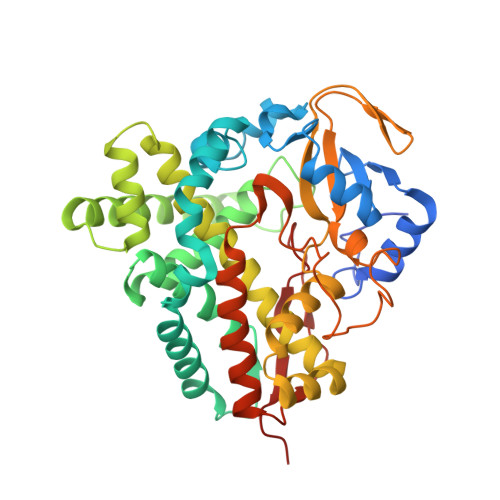Crystal structures of epothilone D-bound, epothilone B-bound, and substrate-free forms of cytochrome P450epoK
Nagano, S., Li, H., Shimizu, H., Nishida, C., Ogura, H., Ortiz de Montellano, P.R., Poulos, T.L.(2003) J Biol Chem 278: 44886-44893
- PubMed: 12933799
- DOI: https://doi.org/10.1074/jbc.M308115200
- Primary Citation of Related Structures:
1PKF, 1Q5D, 1Q5E - PubMed Abstract:
Epothilones are potential anticancer drugs that stabilize microtubules by binding to tubulin in a manner similar to paclitaxel. Cytochrome P450epoK (P450epoK), a heme containing monooxygenase involved in epothilone biosynthesis in the myxobacterium Sorangium cellulosum, catalyzes the epoxidation of epothilones C and D into epothilones A and B, respectively. The 2.10-, 1.93-, and 2.65-A crystal structures reported here for the epothilone D-bound, epothilone B-bound, and substrate-free forms, respectively, are the first crystal structures of an epothilone-binding protein. Although the substrate for P450epoK is the largest of a P450 whose x-ray structure is known, the structural changes along with substrate binding or product release are very minor and the overall fold is similar to other P450s. The epothilones are positioned with the macrolide ring roughly perpendicular to the heme plane and I helix, and the thiazole moiety provides key interactions that very likely are critical in determining substrate specificity. Interestingly, there are strong parallels between the epothilone/P450epoK and paclitaxel/tubulin interactions. Based on structural similarities, a plausible epothilone tubulin-binding mode is proposed.
Organizational Affiliation:
Department of Molecular Biology & Biochemistry, University of California, Irvine, 92697-3900, USA.
















